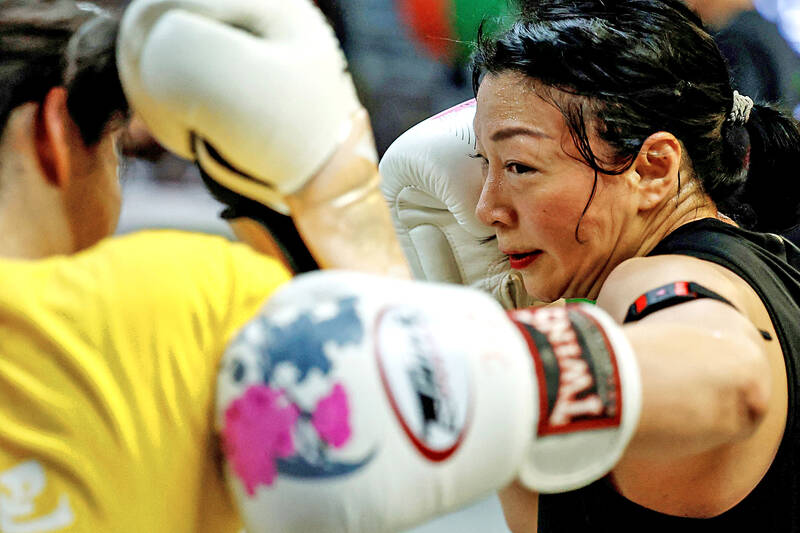In a country where cinemas are normally dominated by wolf warrior blockbusters or nationalist historical epics, the surprise hit of China’s box office this year is a feelgood comedy about a woman who transforms her lackluster life — and herself — through boxing.
Released for the lunar new year holiday in February, Yolo (You Only Live Once) has become the highest grossing film of the year in China, earning more than 3.4 billion yuan (US$470 million) in less than two months, according to the China Movie Information Network. Globally, it is second only to Dune 2.
Critics and cinemagoers are divided about whether the film, a lighthearted comedy which has drawn comparisons with Rocky, is feminist or not. It is directed by and stars Jia Ling (賈玲), a well-known comedian, who reportedly lost 50kg for the role in order to perform the physical as well as mental transformation of the main character, Du Leying, sparking a debate about body image. In February, Jia wrote on Weibo: “It’s not a diet movie, it’s not even about boxing.”

Photo: Reuters
But Jia’s success as a female film-maker is undoubtedly a triumph. Her first film, the 2021 semi-autobiographical comedy Hi, Mom (你好,李煥英) made her the highest-grossing solo female director of all time — until Greta Gerwig took that title last year with Barbie.
Her latest is the only film in the top 10 to be directed by a woman. Films by male directors often “make women seem scared and worried,” said Qiu Yuan, a teacher in Beijing, who saw Yolo three times in the cinema, taking her mother and a female friend along for the second and third viewings. But in Yolo, the main character wants to “become awesome.” Du’s goal “isn’t to lose weight, it’s to exercise and win.”
The film — known in Chinese as Relaguntang (熱辣滾燙, “Hot and spicy”) — follows the life of Du, who starts out as a depressed, overweight, 30-something graduate who has withdrawn from society and lives with her parents. After an argument with her sister forces her to move out from the family home, a chance encounter with a coach at a neighborhood boxing gym sparks a journey of self-transformation.

Photo: Reuters
Whether as an artistic choice or to pass China’s strict censorship regime for film releases, Yolo keeps its focus on Du’s personal life.
“A lot of unpleasant experiences happen to her, but they are all limited to the realm of her friends and family, rather than things happening because of systematic unfairness in society,” said Yu Yaqin, an independent film critic in Beijing.
But in a patriarchal society where women face many barriers in their personal and professional lives, and where overt discussions of feminism are limited, the film has struck a nerve, particularly with female cinemagoers.
Qiu said that women in China lack inspiring figures such as Jia.
“In the west, there are many women who are role models. In my life, my family, my friends, there are no role models or feminists,” she said. Yolo “doesn’t say it’s a feminist film,” in part because it would be difficult for Jia to make such a statement publicly, Qiu said, “but when I take my friends who are not interested in feminism to see this film, they think little by little about how a woman can change her life through working on herself.”
Yu believes that much of the film’s success can be attributed to Jia’s fame and a curiosity among cinemagoers to see her dramatic weight loss. Jia is a familiar face on Chinese television, having risen to fame as a comedy performer in the 2010s.
Yolo “is a really successful film in commercial terms, but it is not an artistic film”, said Yu. “If this film was exactly the same but didn’t have Jia Ling, it wouldn’t be very popular.”

Jacques Poissant’s suffering stopped the day he asked his daughter if it would be “cowardly to ask to be helped to die.” The retired Canadian insurance adviser was 93, and “was wasting away” after a long battle with prostate cancer. “He no longer had any zest for life,” Josee Poissant said. Last year her mother made the same choice at 96 when she realized she would not be getting out of hospital. She died surrounded by her children and their partners listening to the music she loved. “She was at peace. She sang until she went to sleep.” Josee Poissant remembers it as a beautiful

Before the last section of the round-the-island railway was electrified, one old blue train still chugged back and forth between Pingtung County’s Fangliao (枋寮) and Taitung (台東) stations once a day. It was so slow, was so hot (it had no air conditioning) and covered such a short distance, that the low fare still failed to attract many riders. This relic of the past was finally retired when the South Link Line was fully electrified on Dec. 23, 2020. A wave of nostalgia surrounded the termination of the Ordinary Train service, as these train carriages had been in use for decades

March 2 to March 8 Gunfire rang out along the shore of the frontline island of Lieyu (烈嶼) on a foggy afternoon on March 7, 1987. By the time it was over, about 20 unarmed Vietnamese refugees — men, women, elderly and children — were dead. They were hastily buried, followed by decades of silence. Months later, opposition politicians and journalists tried to uncover what had happened, but conflicting accounts only deepened the confusion. One version suggested that government troops had mistakenly killed their own operatives attempting to return home from Vietnam. The military maintained that the

Lori Sepich smoked for years and sometimes skipped taking her blood pressure medicine. But she never thought she’d have a heart attack. The possibility “just wasn’t registering with me,” said the 64-year-old from Memphis, Tennessee, who suffered two of them 13 years apart. She’s far from alone. More than 60 million women in the US live with cardiovascular disease, which includes heart disease as well as stroke, heart failure and atrial fibrillation. And despite the myth that heart attacks mostly strike men, women are vulnerable too. Overall in the US, 1 in 5 women dies of cardiovascular disease each year, 37,000 of them